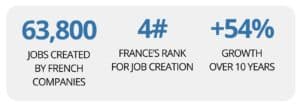Winning Influence: French Corporate Advocacy in the U.S. Landscape
The U.S. lobbying landscape is complex and marked by significant cultural differences between French and American approaches. While American companies have long invested heavily in public affairs, French firms are only beginning to increase their advocacy efforts, with investments still lower than those of other countries. Texas, in particular, is a key state due to its strong policy challenges and diverse lobbying activities. Navigating these differences and regional dynamics is crucial for French businesses aiming to expand their influence. The FACC supports this by connecting companies with stakeholders and guiding effective advocacy at both federal and local levels.
For many French companies, lobbying still carries a sense of discomfort — often linked to opacity or political risk. In contrast, U.S. firms see it as a strategic, regulated tool to secure long-term influence.
U.S. lobbying now relies on structure, compliance, and long-term positioning
Since the early 2000s, lobbying in the United States has evolved from a largely opaque practice into a highly regulated and professionalized industry. The introduction of stricter disclosure rules, growing public scrutiny, and the increasing complexity of federal and state regulations have pushed companies to adopt more strategic, long-term influence approaches. Today, lobbying is no longer just about access — it’s about navigating institutional frameworks, shaping policy debates, and building coalitions over time. For foreign companies like those from France, this shift demands not only financial investment but also cultural and operational adaptation to the unique U.S. political environment.
Lobbying vs. Advocacy: Federal and Local Dynamics
While often used interchangeably, lobbying and advocacy differ in scope and approach. Lobbying typically refers to direct efforts to influence legislation and regulations, most visibly in Washington, D.C., where federal agencies and Congress shape nationwide policy. Advocacy, meanwhile, encompasses a broader range of actions, including public messaging, coalition-building, and community engagement. In a state like Texas, with its own powerful legislature and regulatory bodies, local advocacy can be just as strategic. French companies operating there have the opportunity to tailor their approach by balancing targeted federal lobbying with relationship-building at the state and municipal levels.
To succeed in the U.S., French firms combine business with influence
French companies play a vital economic role in the U.S., with major investments in sectors like energy, tech, transportation, and pharmaceuticals. As key employers and innovators, they contribute significantly to local economies and must navigate a fragmented and competitive regulatory landscape.
From environmental standards to public procurement and DEI (diversity, equity, and inclusion) expectations, U.S. policies evolve rapidly and vary widely. In this environment, the ability to engage with policymakers, shape strategic narratives, and influence regulations is becoming essential. While American companies have long mastered this art, French businesses are still adapting to the specific codes of U.S. advocacy.
The FACC supports French firms by helping them connect with the right stakeholders, coordinate advocacy efforts, and make their voices heard both locally and nationally.
Key Sectors Investing Heavily in Lobbying:
- Pharmaceuticals & Healthcare: Regulation, market access, intellectual property protection
- Energy & Environment: Environmental standards, public procurement, energy transition
- Technology & Telecommunications: Cybersecurity, digital regulation, patents
- Aerospace & Defense: Public and military contracts, trade and security policy
- Agri-food: Sanitary standards, customs duties, access to the U.S. market
An Opportunity for French Companies to Shape U.S. Policy and Showcase Their Economic Impact
Lobbying spending in the U.S. has doubled in 25 years
Lobbying expenditures in the U.S. have more than doubled, rising from under $2 billion in 1998 to over $4,4 billion in recent years. This reflects the increasing complexity and strategic importance of influencing federal policy. Interestingly, while the number of registered lobbyists has slightly decreased since the mid-2000s, overall spending has continued to rise — indicating a shift toward fewer, more specialized actors with higher budgets and stronger influence capabilities.
Source : OpenSecrets

U.S. lobbying is more assertive, regulated, and strategically driven
The table highlights fundamental differences in how French and American companies approach lobbying. French firms often adopt discreet, institutional strategies with limited visibility, whereas U.S. companies operate in a highly professionalized and transparent environment. They rely on a broader array of influence tools, including PACs, think tanks, and grassroots mobilization. This contrast suggests that while French firms are present, their methods may limit their impact in the U.S. context — where assertiveness, early engagement, and diversified tactics are key to shaping outcomes.
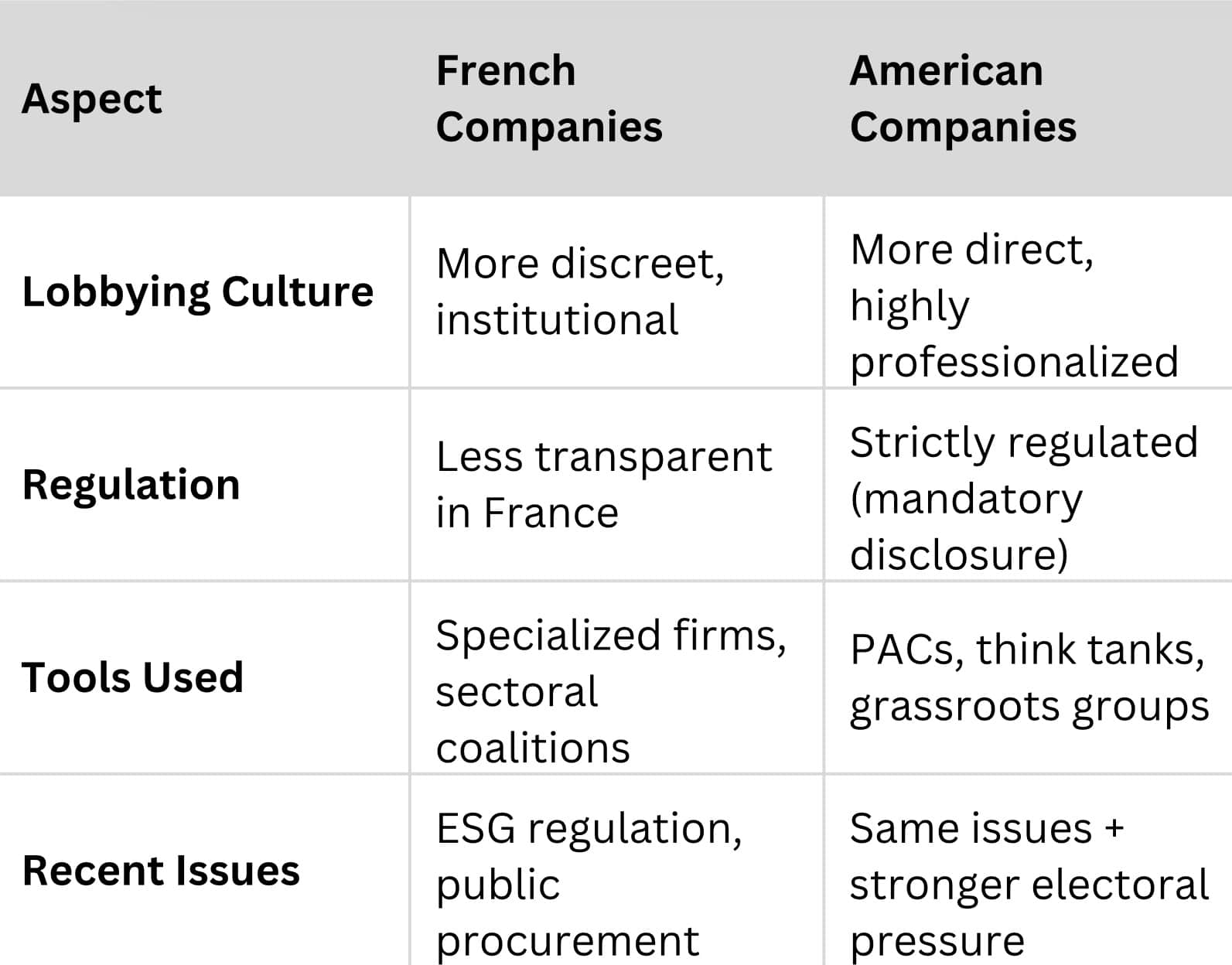
France spends 3 to 4 times less than other major countries to lobby in the U.S
France accounts for less than 0.4% of total lobbying expenditures in the U.S., far behind countries like Japan, Saudi Arabia, or China. Yet this limited presence should not be seen as a weakness — it highlights a strategic opportunity. The relatively low level of foreign lobbying overall suggests that the field remains largely dominated by domestic players, leaving space for international firms to increase their visibility and impact. For French companies, especially those in regulated or high-growth sectors, investing more systematically in U.S. advocacy could open new channels of influence, help anticipate regulatory shifts, and secure a stronger foothold in the world’s most competitive market.
Sources: OpenSecrets – Foreign Lobby Watch, Statista. Total lobbying US

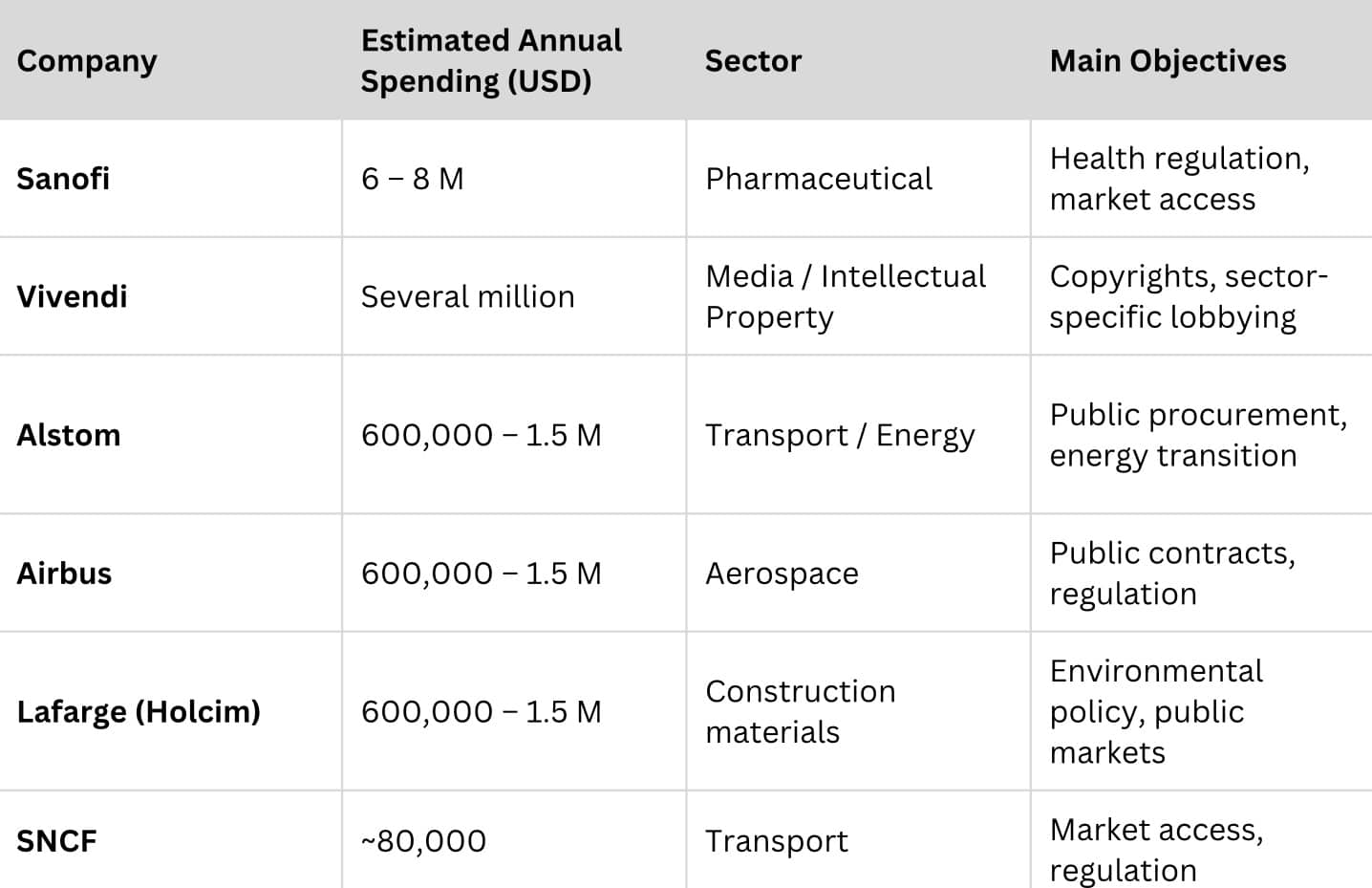
“At its most immediate level, lobbying can be considered an essential element of the democratic process. For French companies, engaging in public affairs and advocacy in Washington is not only legitimate but necessary to defend their interests, understand regulatory trends, and participate in the shaping of international standards.”
— Adapted from Alan Butt Philip, cited in the Ifri report “Business and Foreign Policy: Lobbying in Paris, Washington, and Brussels”
“Foreign companies naturally seek to exert influence in Washington to defend their commercial interests or to try to sway American policy. […] It is only natural that foreign companies or governments also want to exercise their influence at the very heart of American power.”
— Adapted from Alan Butt Philip, cited in the Ifri report “Business and Foreign Policy: Lobbying in Paris, Washington, and Brussels”
$600,000 -$8 million
Source : Le Monde Diplomatique (“Lobbying: la diplomatie parallèle des entreprises françaises à Washington”) and data from the Center for Responsive Politics (OpenSecrets)
This range reflects what a single company may spend annually, depending on sector sensitivity and strategic priorities
French firms rely on coalitions, credibility, and compliance to influence U.S. policy
Direct Lobbying:
Engaging with lawmakers, participating in congressional hearings, and contributing to Political Action Committees (PACs).
Institutional Advocacy:
Working through trade associations, coalitions, and think tanks to influence public discourse and regulatory direction.
Regulatory Adaptation:
Adjusting internal practices (e.g., ESG, DEI policies) to meet U.S. compliance standards, especially for public procurement.
Employee Advocacy:
Empowering local teams and executives to become public-facing ambassadors of the company’s economic and social impact.
While these strategies are common among all multinational companies in the U.S., they are particularly relevant for French companies seeking to enhance their influence and competitiveness in a highly regulated and politically complex environment. The approaches reflect a need to navigate U.S. institutional frameworks, respond to regulatory changes, and build a positive local reputation.
How the FACC Can Help
The French-American Chamber of Commerce (FACC) acts as a trusted partner for French companies looking to strengthen their advocacy in the U.S. market. Through ongoing discussions with economic development agencies and elected officials, the FACC supports French businesses by leveraging established relationships and credibility. This close dialogue with key stakeholders enables the FACC to effectively advocate on behalf of French firms, helping them navigate the complexities of the American political and economic landscape. With its extensive network and tailored programs, the FACC provides valuable guidance and connections to amplify French companies’ voices at both local and federal levels.
- Access to a Franco-American network industry experts, policymakers, and legal advisors
- Workshops and briefings to decode evolving U.S. regulations and compliance frameworks
- Connections with key stakeholders in Washington, including public agencies and trade associations
- Immersive visits and sector-focused missions to better understand the U.S. institutional landscape
- Support in structuring a local advocacy strategy, aligned with American norms and expectations
- Option to collaborate directly with the French-American Chamber of Commerce in Washington, D.C. for tailored support in federal-level lobbying and networking
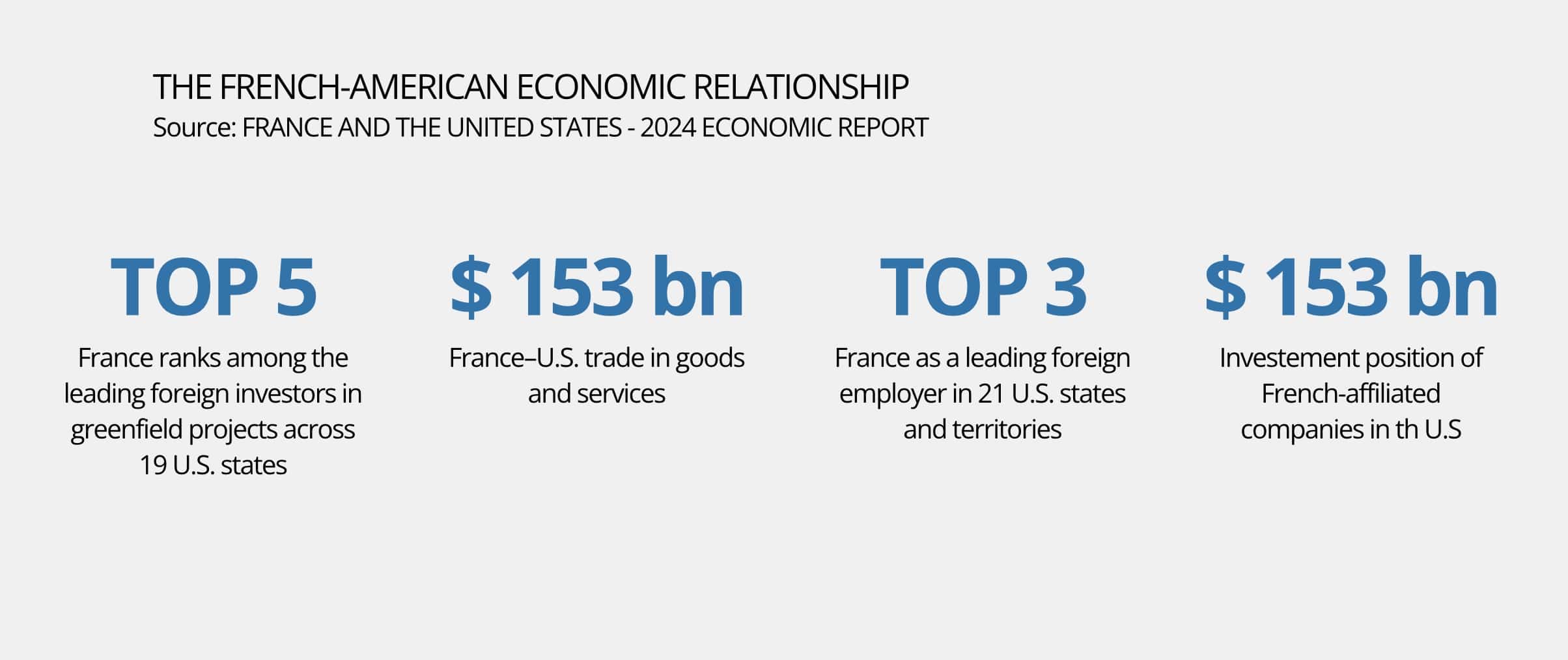
Texas is one of the most politically active and strategic U.S. states for lobbying
A few key sectors shape most of Texas’s political influence
The dominance of the energy sector in Texas lobbying reflects more than economic weight — it reveals how regulation at the state level is actively shaped by industry interests. The strong presence of business services, finance, and healthcare suggests that lobbying here is not just defensive but aimed at steering public policy. For companies entering the Texan market, ignoring state-level lobbying means missing out on real levers of influence in one of America’s most politically active economies.
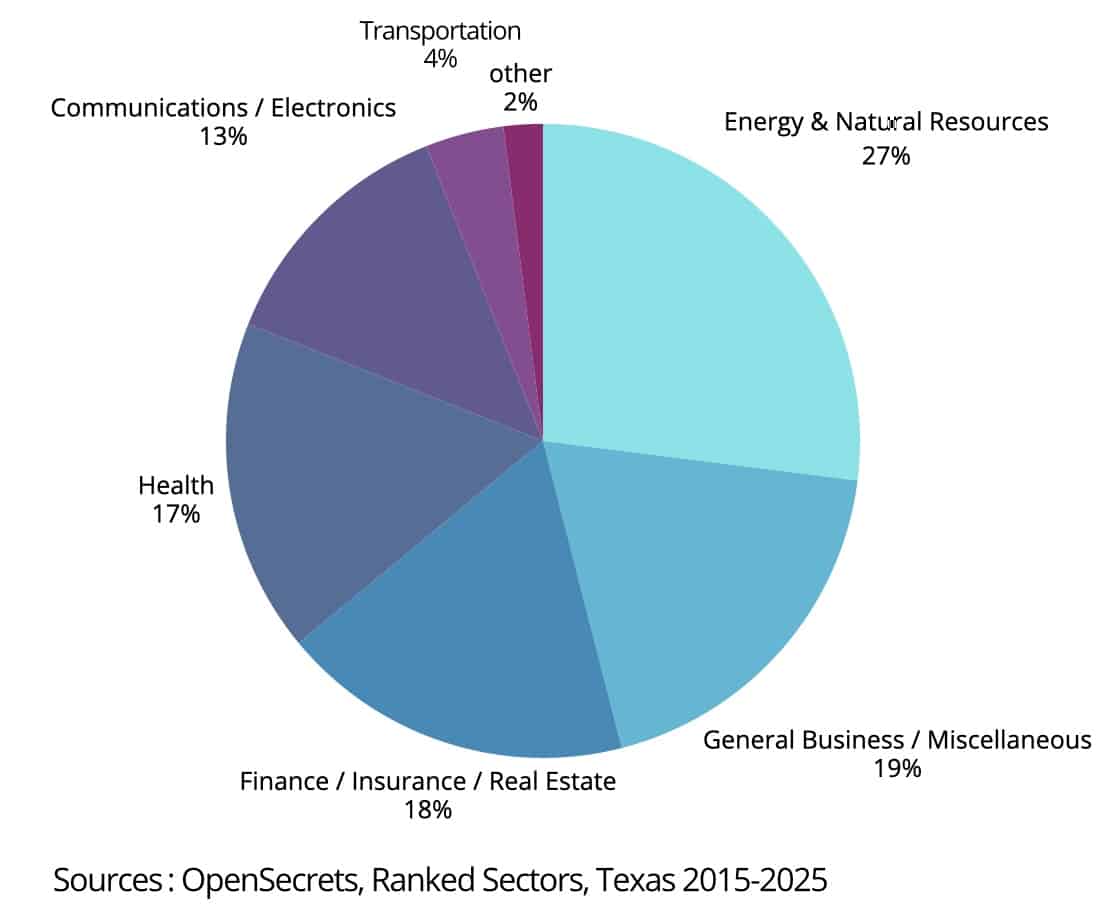
$100,000-$1 million
Source : Texas Ethics Commission
Average lobbying spending by companies in Texas
Key Facts About Lobbying in Texas:
Number of Lobbyists:
Several hundred lobbyists are registered each year with the Texas Ethics Commission, representing both private and public interests.
Regulations:
Any company or organization that spends more than $10,760 annually to influence legislation must register as a lobbyist in Texas.
Transparency:
Details on spending, clients, and lobbying firms are publicly available in the annual reports of the Texas Ethics Commission.
Texas and France: Building Strong Ties and Seizing Lobbying Opportunities
